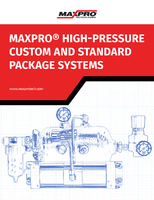Wafer Bonding Machine produces 3-D ICs at room temperature.
Press Release Summary:
Utilizing Fast Atom Beam gun to irradiate atoms on surface of bonding material, Wafer Bonding Machine enables 3-D integration of LSI circuits on 8 in. wafers at room temperature. FAB gun removes oxide film on surface of bonding metal material that normally impedes bonding. Cassette, capable of housing twenty 8 in. wafers, can perform wafer conveying and alignment for bonding automatically. By eliminating heating process, room-temperature bonding frees devices from heat stress.
Original Press Release:
MHI Develops World's First 8-inch Wafer Bonding Machine to Produce 3-D Integrated LSI Circuits at Room Temperature
Tokyo, - Mitsubishi Heavy Industries, Ltd. (MHI) has developed a fully automated 8-inch wafer bonding machine that is capable of producing 3-dimensionally integrated LSI (large-scale integration) circuits at room temperature. The machine represents the world's first commercialization of a system enabling 3-D integration of circuits on 8-inch wafers at room temperature. Efficient bonding of metallic material has been achieved through the adoption of a method of radiating a high-energy-level atom beam. MHI believes that the new machine and its technology will significantly contribute to efforts to further enhance the capacity and performance of LSIs, which are currently faced with limitations in miniaturization.
The newly developed machine adopts a fast atom beam (FAB) gun to irradiate atoms for activating material surface to bond, instead of the ion beam gun used in the company's existing room-temperature bonding machines. Whereas an ion gun radiates an argon ion beam, an FAB gun radiates a neutral atom beam of argon. The FAB gun, which features about 20 times greater energy per particle than an ion gun, is capable of effectively removing oxide film on the surface of bonding metal material that normally impedes bonding. MHI also developed a beam radiation technology that enables even activation of an entire 8-inch wafer surface, even using an FAB gun with high directionality. The new machine has also realized robust bonding of the metallic electrodes that are indispensable for 3-D integrated LSI circuits.
The new system is equipped with a cassette that can house 20 8-inch wafers and can perform wafer conveying and alignment for bonding automatically. The machine is also capable of preliminarily setting of bonding conditions for each wafer individually, to accommodate production of various types in small lots.
MHI's room-temperature bonding machine bonds various materials, such as silicon and metals, at room temperature by radiating an ion or atom beam on the surface of the bonding material - a process that has conventionally been performed by heating. By eliminating the heating process, room-temperature bonding not only frees devices from heat stress and strain, thereby enabling rigid and highly reliable bonding, but also reduces processing time by eliminating the need for a heating/cooling cycle. These advantages, coupled with automated wafer alignment, enable room-temperature bonding to achieve significantly shorter production time and a higher yield ratio, thus realizing reductions in device production costs. Since its launch in 2006, MHI's room-temperature bonding machine has gained wide acceptance mainly for bonding of silicon, oxides and dielectric materials.
Today, as further advancements in LSI capacity and performance using conventional production methods are reaching a limit, 3-D LSIs are seen as a promising breakthrough technology to support ongoing miniaturization and functional enhancement of electronic hardware through applications for various devices, including memories and image censors. With 3-D LSI circuits, the key lies in achieving technologies for creating electrodes through multiple layers, in order to send signals between layered wafers, and for bonding electrodes with high reliability.
Going forward, MHI intends to expand use of room-temperature bonding technology, which can secure higher alignment accuracy than heated bonding and realizes repeated wafer-layer bonding without heat stress, for application in 3-D LSI circuit production. Based on this stance, the company looks to further intensify its proposal-based approach to potential customers, with a view to introducing machines that can accommodate 12-inch wafers.
About Mitsubishi Heavy Industries
Mitsubishi Heavy Industries, Ltd. (TSE: 7011, 'MHI'), headquartered in Tokyo, Japan, is one of the world's leading heavy machinery manufacturers. MHI's diverse lineup of products and services encompasses shipbuilding, power plants, chemical plants, environmental equipment, steel structures, industrial and general machinery, aircraft, space rocketry and air-conditioning systems. For more information, please visit the MHI website at www.mhi.co.jp.




